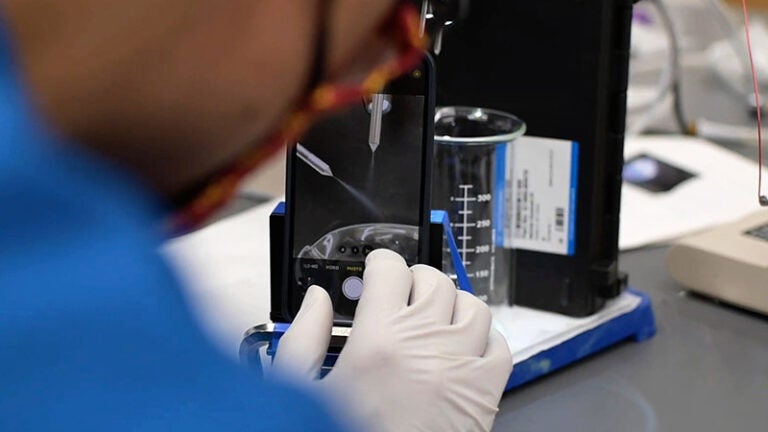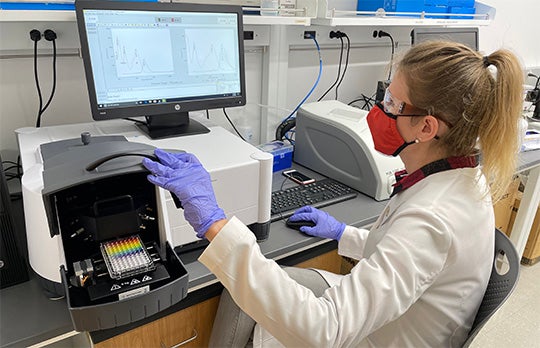
A renewed collaboration between USC and Agilent promises new scientific advancements
In brief:
- USC and Agilent renew their collaborative agreement for another four years.
- The Agilent Fellows program is open to application through Nov. 24.
- The Agilent-sponsored symposium goes global in early 2022.
At the Agilent Center of Excellence in Biomolecular Characterization, scientists conduct leading-edge research that could combat diseases such as cancer, diabetes and Parkinson’s disease.
The collaboration between USC and global research, development and manufacturing company Agilent enters a new phase this fall as they extend their initial four-year agreement for an additional four years.
Established in 2018 in the USC Michelson Center for Convergent Bioscience, the center exemplifies a growing global trend — the partnering of academic institutions and industry firms to hasten research progress.
“We’ve had great success in the first four years of this partnership, and we’re excited to build on those successes with this renewal,” said Stephen Bradforth, senior advisor to the dean for research strategy and development and professor of chemistry at the USC Dornsife College of Letters, Arts and Sciences.
Notable among the initiatives is an extension of the Agilent Fellows program. The two-year postdoctoral positions include mentorship with accomplished USC faculty, a $72,000 annual stipend, $10,000 in discretionary funding for the fellow and access to the state-of-the-art equipment in the Agilent Center of Excellence, not to mention a discount of up to 50% on many of Agilent’s research supplies.
While pursuing their research, fellows act as conduits between USC researchers and Agilent scientists and engineers, providing feedback on the center’s equipment needs and performance as well as insight into potential upgrades, modifications and new uses for the instrumentation.
The program so far has awarded three fellowships. Dmitry Eremin was the first in 2019, working on several projects with Valery Fokin, professor of chemistry at USC Dornsife. These included developing new ways to identify protein complexes within cells using mass spectrometry equipment, work that could improve disease detection, diagnosis and treatment.
Olga Eremina joined the laboratory of Cristina Zavaleta, assistant professor of biomedical engineering at the USC Viterbi School of Engineering, through the Agilent Fellows program in 2020.

Agilent Fellow Olga Eremina uses an Agilent Cary Eclipse Fluorescence Spectrophotometer to assess nanoparticle-based agents designed to detect cancer. (Photo: Courtesy of Olga Eremina.)
Eremina uses nanoparticles to probe deep into tumor tissues, down to the subcellular level, to reveal new insights into how tumors form and what molecules might be targeted with new therapies. Through her research, she also looks for complex molecular interactions within tumor cells that could provide clues to how cancer begins, progresses and spreads. The work could provide tools for predicting the disease before it grows out of control and facilitate development of personalized medicine.
She says the Agilent Fellowship has helped her more effectively pursue her research.
“For me, it was vital to communicate with the specialists at Agilent and get their advice and recommendations regarding products I could use to get the most out of their instruments,” she said.
The newest Agilent Fellow, Matthew Sarnowski, arrived in May to work with Matthew Pratt, professor of chemistry and biological sciences at USC Dornsife. Sarnowski’s research focuses on a process called glycosylation that cells use to modify and control certain proteins. In particular, he investigates how a certain form of glycosylation could be used to inhibit the toxicity of a protein involved in Parkinson’s disease.
A new Agilent Fellow will be announced in December, and applications are being accepted through Nov. 24. The renewed agreement provides for four additional Agilent Fellows to join the university through 2026.
In addition, the continuing partnership allows an expansion of an ongoing Agilent-sponsored symposium series. These symposia seek to showcase research projects supported by the USC Agilent Center of Excellence as well as the research of faculty across USC. A symposium taking place in early 2022 will bring together USC with Agilent Centers of Excellence at the National University of Singapore and Imperial College London and will engage a global audience.
Previous symposia have taken place alternately at Agilent’s headquarters in Santa Clara, California, and at USC. The last, just before the pandemic in 2020, took place at the USC Michelson Center and featured researchers and experts from USC, Agilent, UCLA and BioTek, a life sciences instrumentation company Agilent had recently acquired.
Bradforth sees the ongoing, expanding collaboration between USC and Agilent as a boon for both institutions.
“The partnership so far has proven quite fruitful, exceeding our expectations,” Bradforth says. “This next four years should further establish the Agilent Center as a foundational resource for the university’s scientists and at the same time, by deepening our research contacts, continue to inform on new life science applications for Agilent.
“I’m looking forward to it.”